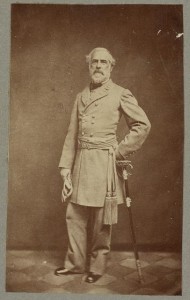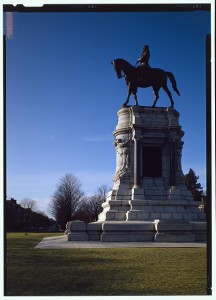From The New-York Times May 23, 1864:
The Chivalry of the Rebel Gen. Lee.
“When monkeys are gods, what must the people be?” ROBERT E. LEE, Commander of the rebel army, is deemed the paragon of Southern chivalry. The rebels have always been vain of being led by one of such pure blood, such stainless honor. Justly enough by their standard. But let us put him to a civilized test.
What is his blood? His grandfather, R.H. LEE, had the taint of treason in him. Writing in 1790, on the Federal Constitution, he said, “When we [the South] attain our natural degree of population, I flatter myself that we shall have the power to do ourselves justice, with dissolving the bond which binds us together.” His great uncle, “Light-Horse HARRY,” was stigmatized by JEFFERSON, who knew him well, as “an intriguer,” “an informer,” a “miserable tergiversator.” Maj.-Gen. CHAS. LEE, of Revolutionary memory, and a kinsman, was, as one may see by IRVING’s Washington, not only a calumniator of WASHINGTON, but was a plotter to supersede him; he was tried by court-martial, after the battle of Monmouth, was found guilty of disobedience of orders, misbehavior before the enemy, and disrespect to the Commander-in-Chief; was subsequently dismissed from the service in disgrace, and soon afterward died in Berkley County, Virginia, leaving in his will these words: “I desire most earnestly that I may not be buried in any church or churchyard, or within a mile of any Presbyterian or consecrated meeting-house; for, since I resided in this country, I have kept so much bad company, while living, that I do not choose to continue it when dead.” The great uncle, ARTHUR LEE, was the libeler of FRANKLIN and JAY and JEFFERSON, and is described by TUCKER, in his life of the latter, to have been “singularly impracticable in his temper and disposition.” The uncle, HENRY LEE, was in Congress at the time of the Presidential struggle between JEFFERSON and BURR, and, according to TUCKER, advised “desperate measures” to defeat the former; and he was a man of such bad character that when, in 1830, Gen. JACKSON, whose fiery partisan he had been, sent his nomination to the Senate for the consulship at Algiers, Mr. TAZEWELL, of his own party and State, Chairman on Foreign Relations, reported against it, and it was unanimously rejected. It would be difficult to name an old family in this country, of any historical mark, whose “blood” has been shown to be of worse quality than that of the LEES of Virginia.
But it is not family that makes the gentleman, or the reverse. It is personal honor. Has ROBERT E. LEE this? We say emphatically that he has it not. He is deficient in its very first and most essential element — truth. He is as mendacious as BEAUREGARD himself. This can be proved incontestably, and that too without going back of the history of the last fortnight. On the 14th of this month he issued an address to his soldiers, which we have published. It is brief, but it contains five broad falsehoods. …[on Sigel, Averill, Steele, Sheridan, and Butler] …
Now these misstatements must have been willful. They are of a character that precludes the possibility of their being the product of mere misapprehension. LEE deliberately and flagitiously lied. If it be said in his behalf that he did it in order to keep up the drooping spirits of his soldiers, we have to say that it is an expedient which no soldier of honor ever adopts. No Commander of the Army of the Potomac has been guilty of anything of the kind. GRANT or MEADE would die on the spot before they would degrade their own manhood, and insult the manhood of their soldiers, by such deception.
The simple truth is that the very fact of a soldier’s abandoning his flag involves an abandonment of character. LEE received his military education from the Government, had been constantly honored and trusted by the Government, and it was the extreme of perfidy in him to turn traitor against the Government. The soul that could once work itself up to a crime like that is capable of any violation of professional honor or moral duty. Amazement is often expressed at the displays of turpitude by rebels who were formerly reputed high-minded men. But we do not sufficiently appreciate the terribly demoralizing effect of the very act of committing treason. It is not morally possible to perpetrate this supreme crime without wrenching and in fact breaking down the whole moral nature. Treason cannot be committed on any scale without its malignity extending to every part of the moral constitution. Fidelity lies at the very core of sound character, and when that rots, all rots.


